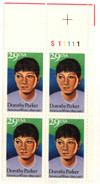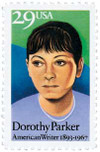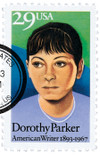
# 2698 - 1992 29c Literary Arts: Dorothy Parker
US #2698
1992 Dorothy Parker
- The 10th stamp in the Literary Arts series.
- Issued on the 99th birth anniversary of Dorothy Parker
- Parker was a writer and humorist
Stamp Category: Commemorative
Set: Literary Arts
Value: 29¢, First Class Mail Rate
First Day of Issue: August 22, 1992
First Day City: West End, New Jersey
Quantity Issued: 105,000,000
Printed by: Stamp Venturers
Printing Method: Photogravure
Format: Gravure printing cylinders of 200 (20 across, 20 down); separated into panes of 50 (10 across, 5 down)
Perforations: 10.9
Why the stamp was issued: The stamp honors Dorothy Parker, who began her writing career as a drama, book, and theater critic. She also wrote poetry and scripts for plays and movies. The stamp was issued on what would have been Parker’s 99th birthday.
About the stamp design: Artist Gregory Rudd painted the portrait of Parker based on a photograph of the writer in the early part of her career.
First Day City: The First Day of Issue ceremony took place in West End, New Jersey, a seaside town where Parker was born and spent her summers during her childhood.
About the Literary Arts Series: The Literary Arts series began in 1979 with a stamp honoring author John Steinbeck. A stamp featuring one of America’s writers was then issued each year after that. The USPS said the series highlights “skillful wordsmiths [who] spun our favorite tales – and American history along with them.”
History the stamp represents:
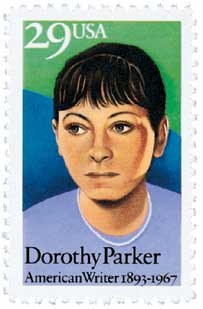
Poet and writer Dorothy Parker (born Dorothy Rothschild) was born on August 22, 1893, in Long Branch, New Jersey.
Parker’s mother died when she was just four years old. She went on to have an unhappy, though privileged, childhood living with her father and stepmother. After her father’s death when she was 20, Parker earned money by playing piano at a dance school.
Parker sold her first poem to Vanity Fair in 1914. And within a few months she was hired as an editorial Assistant for Vogue magazine. Two years later she took a job as a staff writer for Vogue. She then met and married stockbroker Edwin Pond Parker II.
While working at Vanity Fair, Parker wrote the theater reviews and met fellow writers Robert Benchley and Robert Sherwood. Almost every day, the three writers met for lunch at the Algonquin Hotel, forming the basis of the Algonquin Round Table. Over time other writers joined them and they shared stories, jokes, and witty remarks. Newspaper columnists Franklin Pierce Adams and Alexander Woollcott began sharing some of their stories in print, which helped earn Parker a national reputation for her wit.
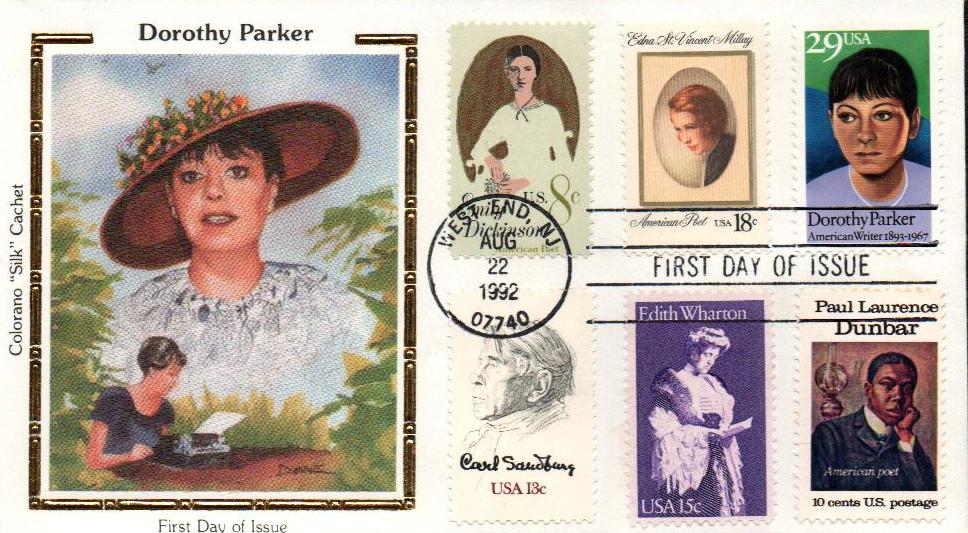
In 1925, Parker was on the board of editors for The New York. With that magazine she gained even more fame for her humorous poems. Parker’s career boomed in the 1920s, when she published about 300 poems in Vanity Fair, Vogue, The New Yorker, Life, McCall’s, and The New Republic. She published her first volume of poetry in 1926 called Enough Rope, which sold 47,000 copies.
In the 1930s, Parker moved to Hollywood and began working on movies. In all she contributed to more than 15 films, including the lyrics for “I wished on the Mon” in The Big Broadcast of 1936. Parker also helped to write the script for A Star is Born, which earned her an Academy Award nomination.
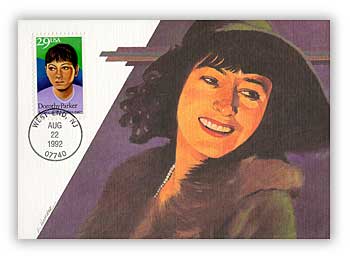
Over time, Parker became more politically active, forming the Hollywood Anti-Nazi League in the 1930s and joining the Joint Anti-Fascist Rescue Committee. In 1950 she was accused of being a Communist and was blacklisted from Hollywood. She went on to write book reviews for Esquire magazine and do some work in radio. She died on June 7, 1967. Parker left her estate to Martin Luther King, Jr., and after his death, it went to the NAACP, which later created a memorial garden in her honor.
Click here to read some of Parker’s poems.
US #2698
1992 Dorothy Parker
- The 10th stamp in the Literary Arts series.
- Issued on the 99th birth anniversary of Dorothy Parker
- Parker was a writer and humorist
Stamp Category: Commemorative
Set: Literary Arts
Value: 29¢, First Class Mail Rate
First Day of Issue: August 22, 1992
First Day City: West End, New Jersey
Quantity Issued: 105,000,000
Printed by: Stamp Venturers
Printing Method: Photogravure
Format: Gravure printing cylinders of 200 (20 across, 20 down); separated into panes of 50 (10 across, 5 down)
Perforations: 10.9
Why the stamp was issued: The stamp honors Dorothy Parker, who began her writing career as a drama, book, and theater critic. She also wrote poetry and scripts for plays and movies. The stamp was issued on what would have been Parker’s 99th birthday.
About the stamp design: Artist Gregory Rudd painted the portrait of Parker based on a photograph of the writer in the early part of her career.
First Day City: The First Day of Issue ceremony took place in West End, New Jersey, a seaside town where Parker was born and spent her summers during her childhood.
About the Literary Arts Series: The Literary Arts series began in 1979 with a stamp honoring author John Steinbeck. A stamp featuring one of America’s writers was then issued each year after that. The USPS said the series highlights “skillful wordsmiths [who] spun our favorite tales – and American history along with them.”
History the stamp represents:

Poet and writer Dorothy Parker (born Dorothy Rothschild) was born on August 22, 1893, in Long Branch, New Jersey.
Parker’s mother died when she was just four years old. She went on to have an unhappy, though privileged, childhood living with her father and stepmother. After her father’s death when she was 20, Parker earned money by playing piano at a dance school.
Parker sold her first poem to Vanity Fair in 1914. And within a few months she was hired as an editorial Assistant for Vogue magazine. Two years later she took a job as a staff writer for Vogue. She then met and married stockbroker Edwin Pond Parker II.
While working at Vanity Fair, Parker wrote the theater reviews and met fellow writers Robert Benchley and Robert Sherwood. Almost every day, the three writers met for lunch at the Algonquin Hotel, forming the basis of the Algonquin Round Table. Over time other writers joined them and they shared stories, jokes, and witty remarks. Newspaper columnists Franklin Pierce Adams and Alexander Woollcott began sharing some of their stories in print, which helped earn Parker a national reputation for her wit.

In 1925, Parker was on the board of editors for The New York. With that magazine she gained even more fame for her humorous poems. Parker’s career boomed in the 1920s, when she published about 300 poems in Vanity Fair, Vogue, The New Yorker, Life, McCall’s, and The New Republic. She published her first volume of poetry in 1926 called Enough Rope, which sold 47,000 copies.
In the 1930s, Parker moved to Hollywood and began working on movies. In all she contributed to more than 15 films, including the lyrics for “I wished on the Mon” in The Big Broadcast of 1936. Parker also helped to write the script for A Star is Born, which earned her an Academy Award nomination.

Over time, Parker became more politically active, forming the Hollywood Anti-Nazi League in the 1930s and joining the Joint Anti-Fascist Rescue Committee. In 1950 she was accused of being a Communist and was blacklisted from Hollywood. She went on to write book reviews for Esquire magazine and do some work in radio. She died on June 7, 1967. Parker left her estate to Martin Luther King, Jr., and after his death, it went to the NAACP, which later created a memorial garden in her honor.
Click here to read some of Parker’s poems.







